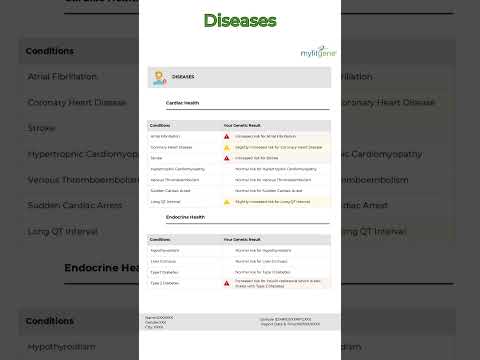When it comes to sports and fitness, everyone wants to go the extra mile. But what if the secret to improving your performance isn’t just about training harder, but training smarter? That’s where genetics come into play. Your unique genetic makeup can offer insights into your strengths, weaknesses, and how to optimize your fitness routine. Let’s dive into how genetics can help you step up your game and improve sports performance.
The Science Behind Sports Performance
Sports performance isn’t just about grit and determination; it’s a complex interplay of biology, training, and recovery. By understanding the role of genetics, you can:
- Identify your body's natural athletic tendencies.
- Tailor fitness training to maximize results.
- Reduce the risk of injuries and burnout.
Why Fitness Training Isn't One-Size-Fits-All
You’ve probably heard of fitness tests like the multistage fitness test (or beep test) and physical fitness tests used to measure endurance, strength, and flexibility. While these tests are helpful, they don’t account for genetic variations that make each individual unique.
Some people excel in endurance sports like marathon running, while others dominate explosive activities like sprinting or weightlifting. This difference is often linked to specific genetic markers, such as:
- ACTN3 gene: Associated with fast-twitch muscle fibers for explosive movements.
- ACE gene: Linked to endurance and cardiovascular efficiency.
Knowing your genetic predispositions allows you to align your training with your body’s natural strengths.
How Genetic Testing Works for Fitness
Genetic testing for sports and fitness involves analyzing DNA to uncover insights about:
- Muscle Composition: Are you built for speed or endurance?
- Recovery Rate: How quickly does your body heal after intense workouts?
- Injury Risk: Are you prone to specific sports injuries?
- Nutritional Needs: Does your body process proteins, carbs, and fats efficiently?
By understanding these factors, you can develop a personalized fitness training plan that works for you.
Boosting Sports Performance with Personalized Fitness Training
Match Training to Your Genetic Profile
Once you know your genetic strengths, you can focus on exercises that complement them. For instance:
- If you have a natural inclination for endurance, prioritize long-distance running or cycling.
- If you’re geared towards power, focus on strength training and sprinting.
Recovery Matters
Recovery is as crucial as training. Genetics can reveal how well your body manages inflammation and muscle repair. For faster recovery:
- Incorporate rest days into your routine.
- Use techniques like foam rolling and stretching.
- Optimize your post-workout nutrition based on your genetic needs.
Injury Prevention
Your genetic makeup can also highlight potential risks, such as susceptibility to joint or ligament injuries. Strengthening vulnerable areas and avoiding overtraining can help you stay in the game longer.
The Role of Nutrition in Fitness
Tailoring Your Diet
Nutrition fuels your performance, and genetic testing can help you determine:
- How your body processes macronutrients (proteins, carbs, fats).
- Any deficiencies in vitamins or minerals.
- Whether certain foods enhance or hinder your performance.
For instance, if you have difficulty metabolizing carbs, a low-carb diet may be more effective for maintaining energy during sports.
Hydration and Electrolytes
Genetic insights can also guide your hydration strategy. Some people lose more sodium through sweat than others, requiring tailored electrolyte intake during workouts.
Fitness Tests and Genetic Insights
Fitness tests, like the multistage fitness test, provide a snapshot of your current physical abilities. Combining these with genetic insights creates a comprehensive view of your fitness potential.
- Step 1: Use fitness tests to measure baseline performance (e.g., VO2 max, flexibility, and strength).
- Step 2: Align results with genetic markers to identify areas for improvement.
- Step 3: Develop a training plan that incorporates both test outcomes and genetic insights.
Actionable Tips to Improve Sports Performance
1. Start with a Fitness Test
Begin by assessing your physical fitness using a test like the beep test. This helps you understand your current endurance and stamina levels.
2. Get a Genetic Test
A genetic fitness test provides deeper insights into your body’s capabilities and needs.
3. Optimize Your Training Plan
Create a personalized plan based on your strengths and areas for growth. Ensure it includes:
- Strength training.
- Cardiovascular workouts.
- Flexibility exercises.
4. Prioritize Recovery
Recovery techniques like stretching, sleep, and proper nutrition should be integral to your routine.
5. Focus on Nutrition
Fuel your body with balanced meals and stay hydrated. Adjust your diet to meet your specific energy needs.
FAQs About Improving Sports Performance
1. Can genetics really influence sports performance?
Yes, genetics play a significant role in determining your natural athletic abilities, recovery rate, and susceptibility to injuries.
2. How do I get started with genetic testing for fitness?
You can consult companies specializing in genetic fitness testing. They’ll provide a detailed report about your body’s capabilities.
3. Are fitness tests still important if I get a genetic test?
Absolutely! Fitness tests measure your current performance, while genetic tests reveal your potential. Combining both offers a complete picture.
4. How can I prevent injuries during sports?
Tailor your training plan based on your genetic predispositions and focus on strengthening areas prone to injuries.
5. What should I eat to boost performance?
A balanced diet rich in proteins, carbs, and fats is essential. Genetic insights can help refine your diet further based on your body’s needs.
The Takeaway: Train Smarter with Genetic Insights
Improving sports performance isn’t just about effort—it’s about strategy. By combining fitness tests with genetic insights, you can train smarter, reduce injuries, and achieve your goals faster. Your body is unique, and your training plan should be too.
Are you ready to take your sports performance to the next level? Start by exploring your genetic blueprint today!






















